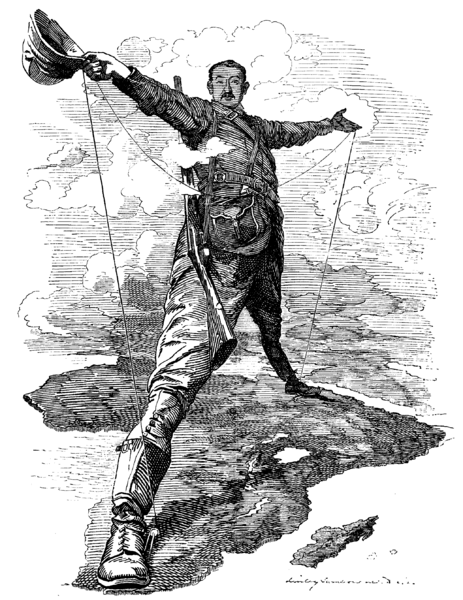Robert Baden-Powell, Cecil Rhodes and Lawrence of Arabia have three things in common:

1) They are all white and male- assigned;
2) They are all suspected to have harbored homosexual desires, and, in the case of Rhodes, to have had a male lover and partner;
3) They all made their names and fortunes through British imperialism.
Will LGBT History Month claim these three characters, once the heroes of Empire, but now an embarrassing reminder of the violence, plunder and oppression of British imperialism? Do we deny their possible homosexuality and gender deviance to avoid tarnishing LGBT history with the legacy of Empire? Can we be ‘out and proud’ about our country’s famous historical figures if those same figures remind us of imperial violence and racism? What do we do when ‘coming out’ about probable LGBT historical figures leads us not to pride but to shame?
The last 10 years have seen significant advances for LGBT rights ‘at home’, but also a growing threat to LGBT people living in former colonies of the British Empire. Nigeria, Uganda, Belize and India, to name but a few, have seen the re-instatements of homophobic legislation which rests on British imperial laws. How are LGBT people, whose complex geographies of belonging span metropolitan Britain and former colonial spaces, to participate in LGBT history month if it operates through a national narrative that leaves out the entanglements of British history with imperial histories?
As the official website of LGBT History Month rightly asserts:
Silence breeds ignorance and distorted imaginings. From these come, at best, embarrassment; at worst, hostility and hate crimes.
By keeping silent about Empire, LGBT History Month offers a distorted imagining of British history. This is dangerous for its uncritical and inaccurate celebration of British ‘civilization’ and ‘progress’, from which we will learn nothing and instead continue a legacy of racism and jingoistic imperialism.
I do not believe that many people involved in LGBT History Month subscribe the Whig-imperial teleology of national history that Michael Gove would have liked to have installed in the History curriculum. Yet by not talking about Empire and the complexities of identity and power we risk inadvertently subscribing to that very narrative.
Do we ignore the difficult associations between white men who may well have loved other men, but who also used their white male bodies to exploit and oppress? Can we be ‘out and proud’ about our country’s ‘queer’ history when so much of that history took place at the expense of other people’s freedom and pride?
Closets, like archives, harbor secrets. And coming out of the closet – the oft-cited solution to queer abjection, repression and misery – may bring out secrets we’re less than happy to celebrate. So, to repose my question, acknowledging that there are no easy answers, what should LGBT History Month say about Empire?
 Onni Gust is Mellon post-doctoral fellow at the University of Illinois Champaign-Urbana, researching and teaching on early-nineteenth century gender formation in the context of European imperial expansion, particularly in India. Onni teaches European Imperial History and Gender and Sexuality Studies, works with LGBT youth and takes part in queer anti-racist and trans activism in the UK and USA.
Onni Gust is Mellon post-doctoral fellow at the University of Illinois Champaign-Urbana, researching and teaching on early-nineteenth century gender formation in the context of European imperial expansion, particularly in India. Onni teaches European Imperial History and Gender and Sexuality Studies, works with LGBT youth and takes part in queer anti-racist and trans activism in the UK and USA.

NOTCHES: (re)marks on the history of sexuality is licensed under a Creative Commons Attribution-NonCommercial-NoDerivatives 4.0 International License.
Based on a work at www.notchesblog.com.
For permission to publish any NOTCHES post in whole or in part please contact the editors at NotchesBlog@gmail.com





First, I think it’s fantastic that you’re asking this question. This is exactly the kind of complex and uncomfortable issue that often goes unacknowledged during history months, because people want to cling to the “101”-type histories that never expose the complexities of the historically-marginalized communities being celebrated.
Second, I think it’s absolutely imperative to incorporate the history of empire within LGBT history month. Most obviously, because we don’t always get to choose with whom to share these identities. The fun thing about history is that it isn’t always convenient, but it gives us perspective.
In the US, for example, there’s been an historic push toward marriage equality. Progress toward this goal has been incredibly swift, and its national reality seems now almost a formality rather than a question. But this effort is not without its detractors within the queer community. In particular, queer activists of color have characterized this as a goal which serves to bolster capitalism and militarism, and really disproportionately benefits white, male, and cis-gendered gay men. These Q(PoC) activists argue that the focus on marriage has distracted from other goals, such as immigration reform, HIV/AIDS prevention efforts, and the struggle against trans* phobia and transmisogyny. They also point to the struggle for marriage equality as an example of a politics of respectability, and lament it as the death of radical queer politics.
I bring this up to highlight the profound and fundamental differences within the LGBTQ community *just in the US.* The idea, in fact, that there is a single LGBTQ community is almost laughable in the face of these critiques. Many of these queer activists are PoC, poor, disabled, immigrants, and other marginalized intersectional identities. And, in looking at the “official gay” reactions to these (from places like the Human Rights Campaign, and other groups affiliated with the Democratic Party), for instance), it is easy to see that there is just as much ignorance of intersectional privilege among LGBTQ folk as there is within the wider population.
It is important to talk about Empire during LGBT history month for exactly this reason. It is an excellent lesson in intersectionality. Too often, there is an assumption, especially outside of academia, that a shared identity automatically means a common political agenda. That has simply never been the case. Whereas the Empire was a place of increased sexual freedom for many of these white Britons (and other European men as well), they did not use their power to help other same-sex-loving people in the colonies. Rather, they abused that authority not only to exploit entire populations, but in particular to criminalize and stigmatize same-sex-loving behaviors and relationships, which in many places had been at least tolerated, if not celebrated. In these cases (as in many others, frankly, if we really pay attention), whiteness and economic privilege speak louder than sexual identity.
We must acknowledge this, as historians, because it suggests work yet to do. It offers helpful parallels for our own time, especially since we can see how detrimental racism and imperialism have been specifically within LGBT communities (clearly those things are detrimental to everybody, but in these cases, they have incredibly destructive effects specifically for LGBT-identified and same-sex-loving people). As the saying goes, sunshine is the best disinfectant.
Pingback: What will .GAY stand for? | Notches: (re)marks on the history of sexuality